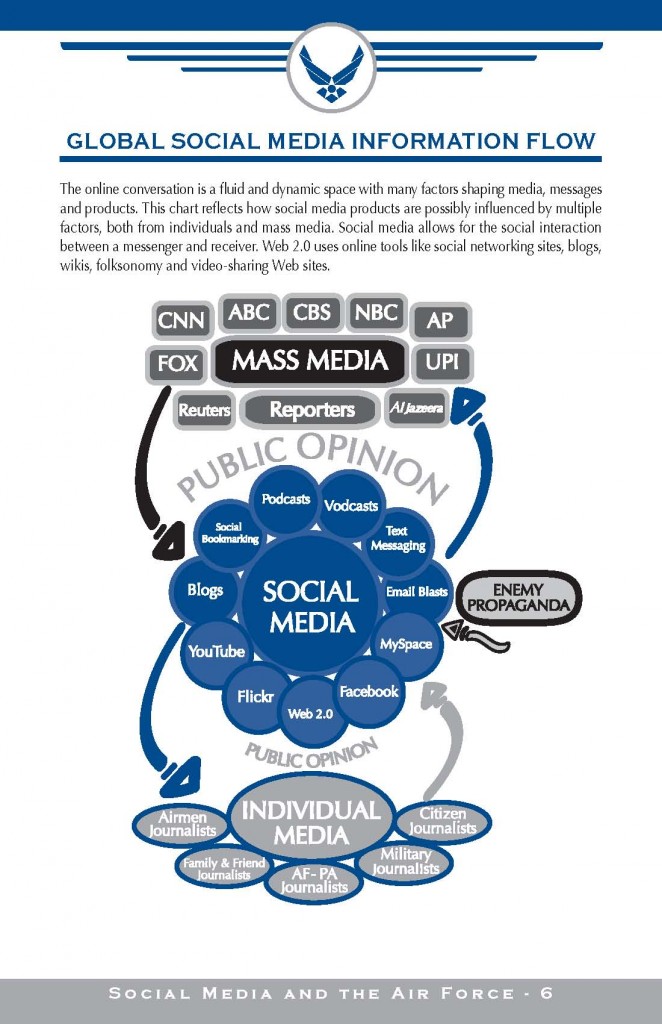even there is more in what world we are living now...
 Army of Fake Social Media Friends to Promote Propagandahttp://www.pcworld.com/article/220495/army_of_fake_social_media_friends_to_promote_propaganda.htmlFBI Intelligence Information Handbook how to engage in social networks. This is secret service internet use policy. http://www.pcworld.com/article/220495/army_of_fake_social_media_friends_to_promote_propaganda.html
Army of Fake Social Media Friends to Promote Propagandahttp://www.pcworld.com/article/220495/army_of_fake_social_media_friends_to_promote_propaganda.htmlFBI Intelligence Information Handbook how to engage in social networks. This is secret service internet use policy. http://www.pcworld.com/article/220495/army_of_fake_social_media_friends_to_promote_propaganda.html
10 tips how air force professionals are prepared to act on social networks
TOP 10 TIPS FOR SOCIAL MEDIA1
DON’T GIVE CLASSIFIED INFODon’t divulge classified, FOUO or sensitive materials, photos or video. OPSEC is crucial to our mission, think before you speak or film—if you’re not sure, ask someone! A harmless video of an Airman dancing on the flightline could be sensitive if it’s a deployed environment showing bombers on the flightline. Be smart. Security is at the source.
2
STAY IN YOUR LANEIf you’re an aircraft mechanic, you’re well suited to communicate messages about aircraft maintenance. If you’re an aircraft mechanic blogging about legal issues—reconsider your blog.
3
DON’T LIECredibility is critical, without it, no one cares what you have to say…it’s also punishable by the UCMJ to give a false statement.
4
GIVE YOUR OPINIONYes, tell them what YOU think…just make sure you state that this is your opinion and not that of the organization. Also, be sure to identify what is your opinion and what is factual.
5
ALWAYS IDENTIFY YOURSELFIdentification makes your post more credible.
6
SAFETYVideos that get widespread attention, or become “viral,” feature death-defying stunts or acts that are considered “extreme” in nature. Don’t let the desire to get your message across compromise your consideration for safety.
7
BE AWARE OF THE IMAGE YOU PRESENTIf using a visual medium, don’t let your message get overshadowed because the viewer’s attention is drawn to your improperly worn uniform or something occurring in the background. The image you present will set the tone for your message and often mean the difference of whether or not people listen to your message. Your tactical representation could have strategic and international consequences for the Air Force and the nation.
8
USE COMMON SENSEThis is the bottom line. If you wouldn’t say it in front of your mother, you probably shouldn’t say it on YouTube. Realize that your words and images will go out to thousands and possibly millions of people around the world instantly and once it’s out there, it’s out there for good. Your unit Public Affairs shop should always be a source of advice and guidance in this medium. Also, be careful what personal information you divulge, such as address, phone numbers or any information that could aid identity thieves or the enemy.
9
DON’T BE AFRAID TO TAKE CALCULATED RISKSMilitary life often deals in ambiguity: In order to make the best decision, it’s recommended to take in as many variables as possible in order to make the most accurate decision.
10
THE ENEMY IS ENGAGEDThe enemy is engaged in this battlespace and you must engage there as well.
…
Documenthttp://publicintelligence.net/u-s-air-force-social-media-guide/interesting site to check
http://publicintelligence.netespionage toolhttp://ai.arizona.edu/research/terror/supported by wow
•Officers and domain experts of Tucson Police Department, Arizona Department of Customs and Border Protection, and San Diego Automatec Regional Justice Information System (ARJIS) Program
•Dr. Marc Sageman, University of Pennsylvania
•Dr. Edna Reid, Federal Bureau of Investigation
•Dr. Johnny Ryan, The Institute of International and European Affairs (IIEA)
•Rick Eaton, Simon Wiesenthal Center
•Dr. Joshua Sinai, The Analysis Corporation
•Dr. Shlomo Argamon, Illinois Institute of Technology
•Chip Ellis, Memorial Institute for the Prevention of Terrorism (MIPT)
•Rex Hudson, Library of Congress
•Dr. Chris Yang, Drexel University
•Dr. Gabriel Weimann, University of Haifa, Israel
•Dr. Mark Last, Ben-Gurion University, Israel
•Drs. Henrik Larsen and Nasrullah Memon, Aalborg University, Denmark
•Dr. Katrina von Knop, George Marshall Center, Germany
•Dr. Jau-Hwang Wang and Robert Chang, Central Police University, Taiwan
•Dr. Ee peng Lim, Singapore Management University, Singapore
•Dr. Feiyue Wang, Chinese Academy of Sciences, China
•Dr. Michael Chau, Hong Kong University













 software, leading one to suspect that it may well be delivering to the Pentagon the identity of its customers.
software, leading one to suspect that it may well be delivering to the Pentagon the identity of its customers.
